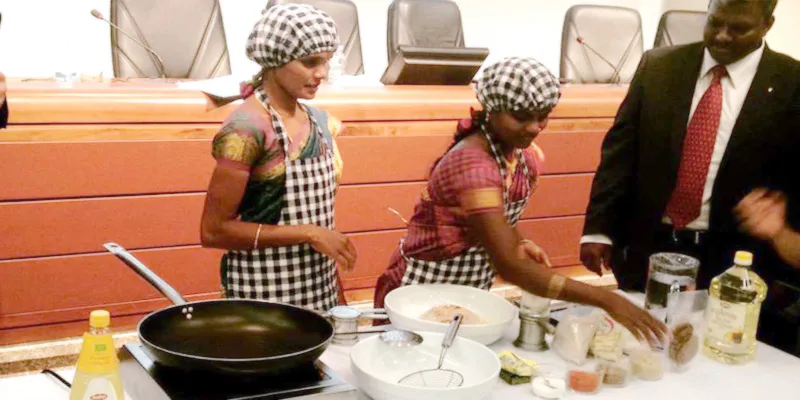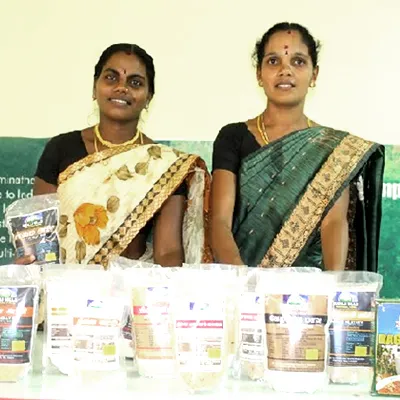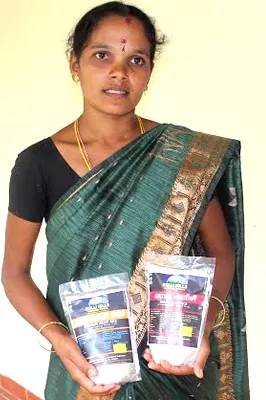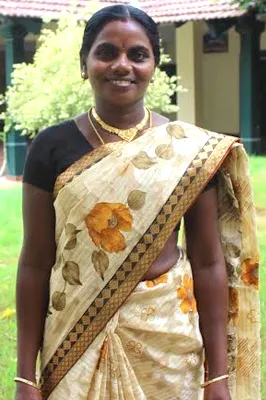The incredible journey of two tribal women from Kolli hills to Italy
How often do you get to hear success stories of tribal women from the hinterland? The opportunity to meet Mallika and Jayalalitha from Kolli hills, a scenic tribal hamlet in Tamilnadu naturally aroused my curiosity. On a sunny morning, YourStory met them at the M S Swaminathan Research Foundation (MSSRF), Chennai where they were available for a few hours on transit from Italy.

Kolli hills to Italy
Despite farming not being a lucrative occupation, Mallika and Jayalalitha have been working undettered for the last 10 years. Both these women shared the view that the practice of growing traditional food like millets should not be given up. Help came in the form of the intervention program that MSSRF ran in Kolli Hills. The determination to preserve the traditional food crop, the zeal to learn and the willingness to share has enabled Mallika and Jayalalitha to leave for foreign shores. The duo represented India at the biowomen conference conducted by Bioversity International at Milan, Italy. These women from Kolli hills proudly demonstrated the traditional snack item “Murukku” that was made from the value added millet produce.
Preserving the tradition
Millet food products are being looked at with renewed interest only in the last few years, thanks to the increasing lifestyle diseases that have compelled us to become health conscious. Though farmers like Mallika and Jayalalitha have been growing millets traditionally, the low demand for these products in the past drove them to discontinue this. The produce that they grew, besides self consumption could be sold

only at the local village. Besides this, the process of withering, grinding etc post the harvest was a cumbersome manual task which prompted them to reduce the farming activity of such crops.Braving these adverse conditions, Mallika and Jayalalitha continued to grow millets along with other crops like corn, pepper, coffee, bean varieties and fruits like pineapple, guava and banana.
This was when help came from MS Swaminathan Research Foundation, who through their intervention programme, devised a plan to preserve these traditional crops. The foundation provided small scale machinery to ease the process of manual work.
Self-help groups
“The machinery provided by MSSRF was a real blessing; it saved the 3 hours of our labour to mere 30 minutes. This was a real motivation and boosted our confidence,” says Jayalalitha, who began growing the traditional millets on a larger scale.
Today Kolli hills has around 1500 members across 109 SHGs. Mallika and Jayalalitha are at the forefront of the 13 member Mullai Women Self Help Group who are growing 6 varieties of millet crops.
Jayalalitha’s life journey
27 year young Jayalalitha has been practicing farming in her 4 acre land for the past 10 years. She along with her husband is growing different varieties of millets besides other crops like corn, pepper, coffee, pineapple, guava and banana varieties.

Being married at 18, she is the mother of 3 kids aged 7, 3 and 2.5 years. Educated till the 9th standard, she has been very naive with no exposure to the outside world. “I joined the SHG in 2010 through Mallika. Life post that has completely changed; from being a person with lot of inhibitions today I have a lot of confidence to achieve more and be a motivation to lot of women like me. The training programmes that I attended in Dharwad, New Delhi, Avinashi and Namakkal has moulded me,” says Jayalalitha.
When asked about the Italy travel, she beams with happiness and takes pride in her journey so far, adding that she is able to save after taking care of all household expenses and contribute to the economic growth of the family.
“Women should come to the forefront. We should not be dependent on men for even small things.”
Millets are not a great food of interest for kids who neither like the taste nor the colour. This is where training helped them to convert it into a value added product and it received a great response in the market as well.
The journey of Mallika

Mallika too has been practicing farming for the past ten years. Educated till the 7th standard, she says that was the maximum level of education that was available at that time in her village. 35 year old Mallika was married off when she was 19. She too has 3 children and comes across as a very confident person who wants her children to study and do well.
“The complex process and other conditions had led to a decline in the farming of traditional millets. That is when MSSRF intervention programme helped us. Today we have grown to a level of selecting seeds for cultivation,” says Mallika. “We were not able to save the seeds for long in the past but things have changed for good. Today we have seed bank where we are able to share and distribute seed varieties with other groups. Quality seeds should never be foregone,” insists Mallika.
Mallika has also attended training programmes at Dharwad, New Delhi, Avinashi and Namakkal. She says with pride that their value added products are being sold in 13 districts through the Kollimalai Agriculture Society.
“Women should hone their talent, take lead role and be independent,” says Mallika
When asked about her plans after Italy, she says “I want to add more value added products and touch more lives to take up healthy living”
Throughout our conversation, one thing that both women insisted on is, “We should never let go of our traditional healthy way of living, we should preserve and increase the millet cultivation and consumption.” And interestingly there is a very definite reason for their passion – the most common “diabetes” is a never heard word in their village.
Their mission to spread this message has gone global now with their Italy travel. The two women from the village were the sole representatives from India at the “Biowomen” conference organised by the Bioversity International Agricultural Development and Research Organisation at Milan, Italy.
“We were not even aware of what kind of food habits that was prevalent there; the opportunity to demonstrate our traditional snack item “murukku” was such a great experience and learning.” Their maiden international travel was certainly the happiest moment in their lives and have instilled great confidence in them.
Besides India, the international conference had custodian farmers from Bolivia and Male.
Curious to know the recipe for the traditional millet snack that was demonstrated at Italy? – Here is the link







